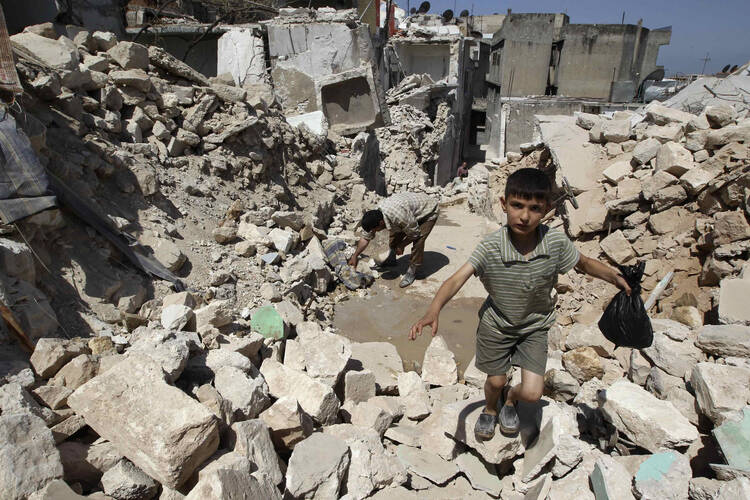The explosion of civil unrest in the Arab world since 2011 may have toppled authoritarian regimes and larcenous despots, but it has done little to address long-term internecine resentments and so far has resulted in even less religious freedom. That’s among the findings of a report released today from the Pew Forum on Religion and Public Life.
That’s bad news for American foreign policy makers who retain the hope that the various ongoing struggles and conflicts of the Arab Spring might herald a flowering of democracy across the Middle East. Conditions were already poor before the unleashing of long simmering social and sectarian forces in Libya, Yemen, Egypt, Syria and other Arab states. Before the Arab Spring, government restrictions on religion and social hostilities involving religion were higher in the Middle East and North Africa than in any other region of the world, according to previous Pew research. Pew reports that government restrictions in the region remained high in 2011, while “social hostilities” among different religious communities markedly increased. For instance, the number of countries in the region experiencing sectarian or communal violence between religious groups doubled from five to 10.
Despite—or perhaps because of—the ouster of former president Hosni Mubarak, worldwide religious restrictions were the worst in Egypt. Pew reports: “Although Egypt’s score on the GRI increased only slightly, from 8.7 as of mid-2010 to 8.9 in 2011, this represented the highest score on this index by any country during the five years covered by the study. Not only was each of the 20 types of government restrictions present in Egypt in 2011, but the level of the restrictions was relatively high.” According to the report, government restrictions in Egypt included active use of force against religious groups; lack of intervention in religious discrimination; very high favoritism of one religion above others; prohibitions on Muslims converting from Islam to other religions; stigmatization of some religious groups as dangerous sects or cults; and restrictions on religious literature or broadcasting.
“Although the upheavals were greater in some countries than in others, each country in the region was – at least to some extent – affected by the events associated with the Arab Spring,” Pew researchers said. Pew maintains the “Global Restrictions Index,” which tracks limits on religious expression. According to the GRI, all 20 countries in the Middle East and North Africa continued government policies of intimidation and harassment of religious groups. Such acts can include physical assaults; arrests and detentions; the desecration of holy sites and discrimination against religious groups in employment, education and housing.
Two countries had large changes (2.0 points or more) higher in their GRI scores on--Bahrain and Somalia. In Bahrain, the government’s spring 2011 crackdown in response to the Arab Spring uprising included the destruction of Shia mosques, religious centers and shrines. In areas of Somalia controlled by the Islamic extremist group al-Shabaab, the population faced restrictions on activities deemed un-Islamic. Penalties for violations included detention, flogging, amputation and stoning.
Overall, across the five years of its study, Pew reports that religious groups were harassed in a total of 185 countries at one time or another. Adherents of the world’s two largest religious groups, Christians and Muslims—who together comprise more than half of the global population—were harassed in the largest number of countries, 145 and 129 respectively. But significantly Jews, who comprise less than 1 percent of the world’s population, experienced harassment in a total of 90 countries, while members of other world faiths were harassed in a total of 75 countries. In 2011, Christians were restricted in the most countries (105).
But the Middle East was not only region experiencing increasing religious restrictions. Pew researches say that the Americas, Europe, sub-Saharan Africa and the Asia-Pacific region all had increases in overall restrictions on religion in 2011. Globally, the share of countries with high or very high restrictions on religion rose, according to the Pew report, from 37 percent in the year ending in mid-2010 to 40 percent in 2011, a five-year high. Pew reports: “Because some of the most restrictive countries are very populous, more than 5.1 billion people (74 percent) were living in countries with high government restrictions on religion or high social hostilities involving religion, the brunt of which often falls on religious minorities.”
Among the world’s 25 most-populous countries, Egypt, Indonesia, Russia and Pakistan had the most restrictions on religion in 2011. Pew reports that government restrictions declined slightly in Europe, but social hostilities increased. Asia and the Pacific had the sharpest increase in government restrictions, though the level of social hostilities remained roughly the same. By contrast, social hostilities edged up in sub-Saharan Africa, but government restrictions stayed about the same. Both government restrictions and social hostilities increased slightly in the Americas but remained relatively low. None of the 35 countries in the region had high social hostilities, but in 2011, eight countries (Brazil, Chile, Colombia, Cuba, Haiti, Mexico, the United States and Venezuela) had moderate hostilities, a slight increase from mid-2010, when five were in the moderate category.
The study also looked at the extent and direction of change in social hostilities involving religion within each country between the year ending in mid-2010 and calendar year 2011. Nine countries (5 percent) had large changes (2.0 points or more) in their scores on the 10-point “Social Hostilities Index,” and all nine (Senegal, Sudan, Tunisia, Swaziland, Bulgaria, Syria, Maldives, Samoa and Norway) were in the direction of higher hostilities. In Norway, for example, Anders Behring Breivik killed 77 people on July 22, 2011, in a mass shooting at a youth camp and a bomb attack on government buildings. Before the attack, he accused the government of “treason” for supporting Muslim immigration. In Syria, the ongoing civil war has increased sectarian violence between religious groups in the country.








